Constitutional Law Report: Judiciary's Role in UK Rule of Law
VerifiedAdded on 2020/01/21
|10
|3236
|65
Report
AI Summary
This report examines the relationship between the UK judiciary, executive, and legislature within the framework of constitutional law, focusing on the judiciary's commitment to upholding the rule of law. It analyzes the impact of the Constitutional Reform Act 2005, which aimed to strengthen judicial independence and separate the judiciary from the executive and legislature. The report discusses key aspects of the rule of law, including legal certainty, equality, fairness, and due process, and how these principles are applied within the UK legal system. It also explores specific cases and legislative changes that demonstrate the judiciary's willingness to act independently and uphold the law, even when facing pressure from the executive or legislature. The report highlights the importance of the separation of powers and the judiciary's role in ensuring that all individuals and entities, including the government, are subject to the law.
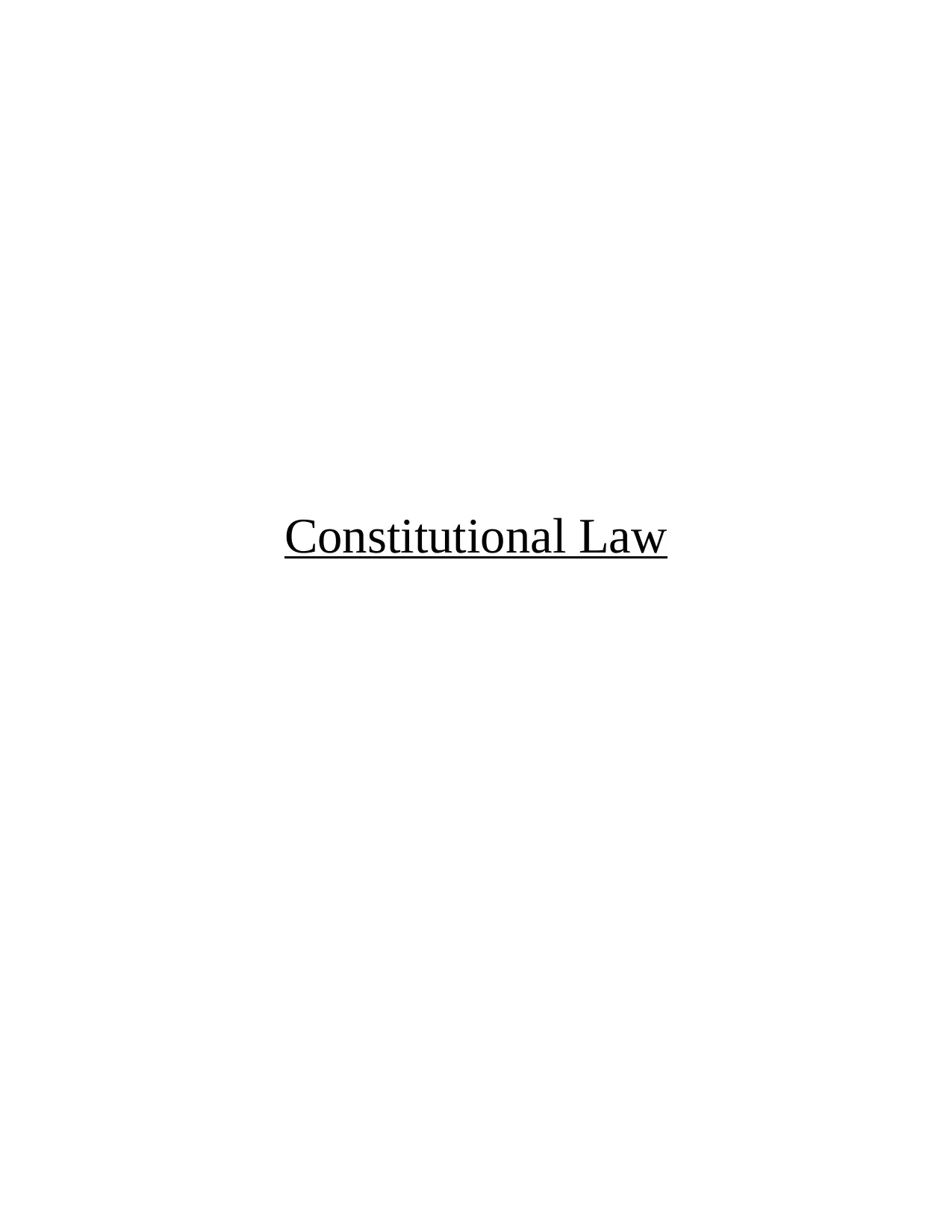
Constitutional Law
Paraphrase This Document
Need a fresh take? Get an instant paraphrase of this document with our AI Paraphraser
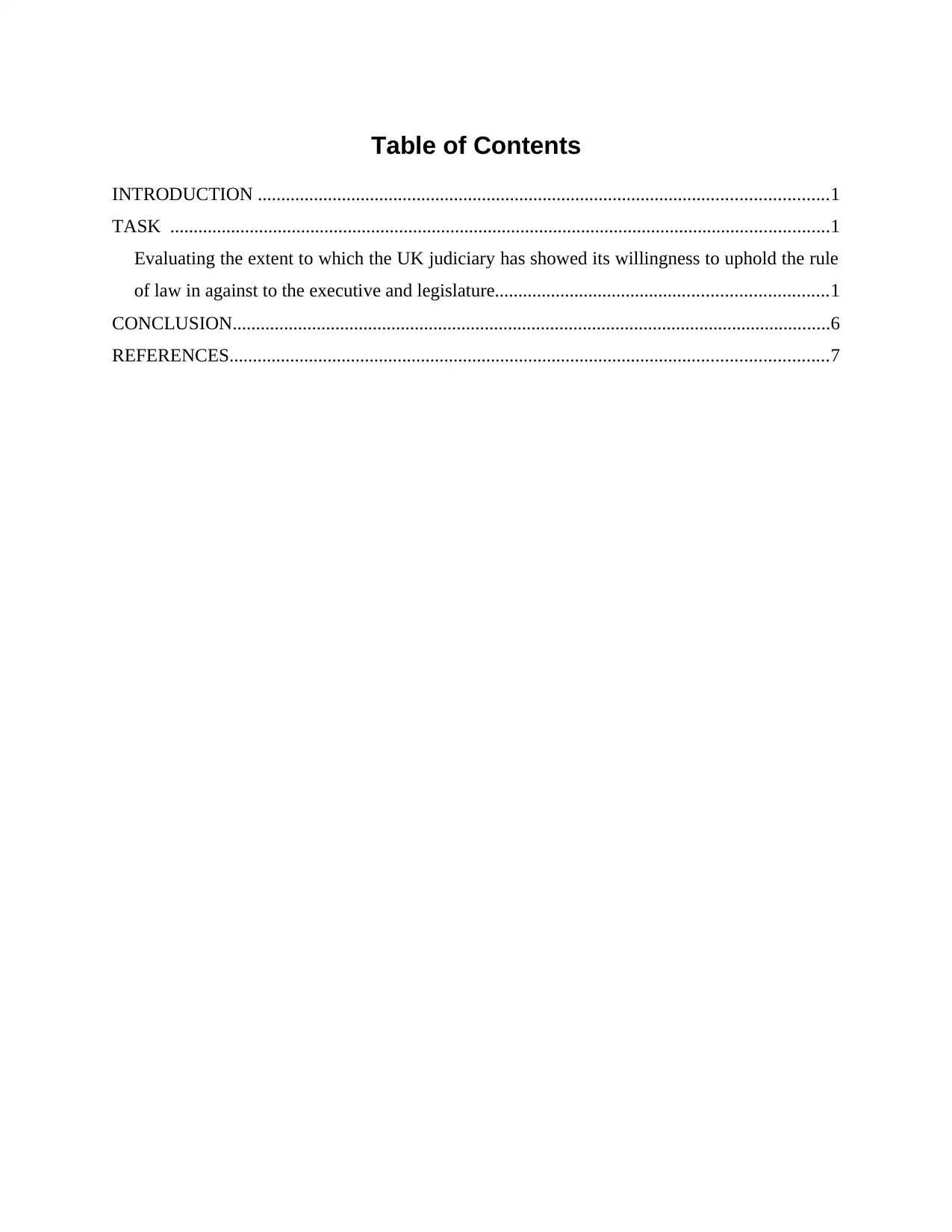
Table of Contents
INTRODUCTION ..........................................................................................................................1
TASK .............................................................................................................................................1
Evaluating the extent to which the UK judiciary has showed its willingness to uphold the rule
of law in against to the executive and legislature.......................................................................1
CONCLUSION................................................................................................................................6
REFERENCES................................................................................................................................7
INTRODUCTION ..........................................................................................................................1
TASK .............................................................................................................................................1
Evaluating the extent to which the UK judiciary has showed its willingness to uphold the rule
of law in against to the executive and legislature.......................................................................1
CONCLUSION................................................................................................................................6
REFERENCES................................................................................................................................7
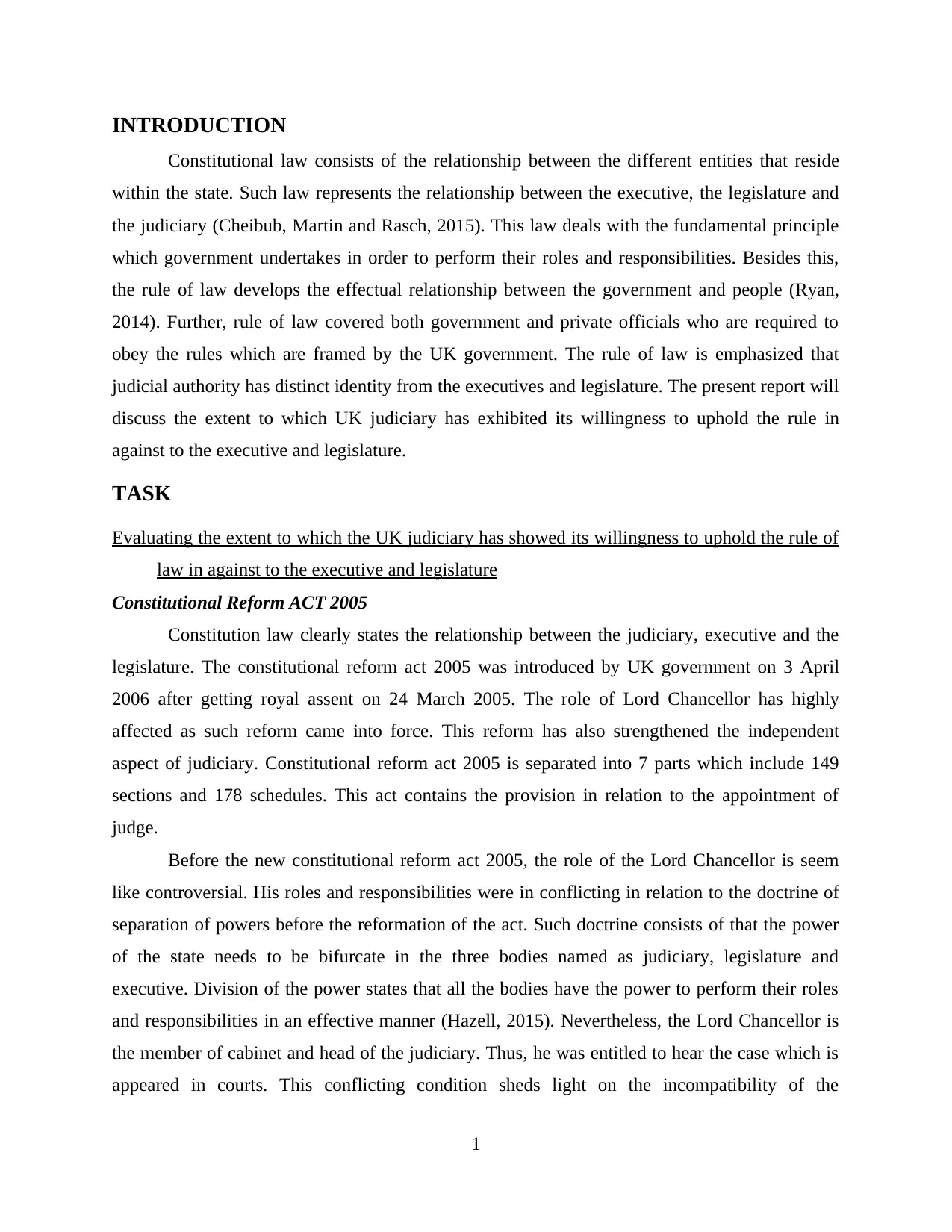
INTRODUCTION
Constitutional law consists of the relationship between the different entities that reside
within the state. Such law represents the relationship between the executive, the legislature and
the judiciary (Cheibub, Martin and Rasch, 2015). This law deals with the fundamental principle
which government undertakes in order to perform their roles and responsibilities. Besides this,
the rule of law develops the effectual relationship between the government and people (Ryan,
2014). Further, rule of law covered both government and private officials who are required to
obey the rules which are framed by the UK government. The rule of law is emphasized that
judicial authority has distinct identity from the executives and legislature. The present report will
discuss the extent to which UK judiciary has exhibited its willingness to uphold the rule in
against to the executive and legislature.
TASK
Evaluating the extent to which the UK judiciary has showed its willingness to uphold the rule of
law in against to the executive and legislature
Constitutional Reform ACT 2005
Constitution law clearly states the relationship between the judiciary, executive and the
legislature. The constitutional reform act 2005 was introduced by UK government on 3 April
2006 after getting royal assent on 24 March 2005. The role of Lord Chancellor has highly
affected as such reform came into force. This reform has also strengthened the independent
aspect of judiciary. Constitutional reform act 2005 is separated into 7 parts which include 149
sections and 178 schedules. This act contains the provision in relation to the appointment of
judge.
Before the new constitutional reform act 2005, the role of the Lord Chancellor is seem
like controversial. His roles and responsibilities were in conflicting in relation to the doctrine of
separation of powers before the reformation of the act. Such doctrine consists of that the power
of the state needs to be bifurcate in the three bodies named as judiciary, legislature and
executive. Division of the power states that all the bodies have the power to perform their roles
and responsibilities in an effective manner (Hazell, 2015). Nevertheless, the Lord Chancellor is
the member of cabinet and head of the judiciary. Thus, he was entitled to hear the case which is
appeared in courts. This conflicting condition sheds light on the incompatibility of the
1
Constitutional law consists of the relationship between the different entities that reside
within the state. Such law represents the relationship between the executive, the legislature and
the judiciary (Cheibub, Martin and Rasch, 2015). This law deals with the fundamental principle
which government undertakes in order to perform their roles and responsibilities. Besides this,
the rule of law develops the effectual relationship between the government and people (Ryan,
2014). Further, rule of law covered both government and private officials who are required to
obey the rules which are framed by the UK government. The rule of law is emphasized that
judicial authority has distinct identity from the executives and legislature. The present report will
discuss the extent to which UK judiciary has exhibited its willingness to uphold the rule in
against to the executive and legislature.
TASK
Evaluating the extent to which the UK judiciary has showed its willingness to uphold the rule of
law in against to the executive and legislature
Constitutional Reform ACT 2005
Constitution law clearly states the relationship between the judiciary, executive and the
legislature. The constitutional reform act 2005 was introduced by UK government on 3 April
2006 after getting royal assent on 24 March 2005. The role of Lord Chancellor has highly
affected as such reform came into force. This reform has also strengthened the independent
aspect of judiciary. Constitutional reform act 2005 is separated into 7 parts which include 149
sections and 178 schedules. This act contains the provision in relation to the appointment of
judge.
Before the new constitutional reform act 2005, the role of the Lord Chancellor is seem
like controversial. His roles and responsibilities were in conflicting in relation to the doctrine of
separation of powers before the reformation of the act. Such doctrine consists of that the power
of the state needs to be bifurcate in the three bodies named as judiciary, legislature and
executive. Division of the power states that all the bodies have the power to perform their roles
and responsibilities in an effective manner (Hazell, 2015). Nevertheless, the Lord Chancellor is
the member of cabinet and head of the judiciary. Thus, he was entitled to hear the case which is
appeared in courts. This conflicting condition sheds light on the incompatibility of the
1
⊘ This is a preview!⊘
Do you want full access?
Subscribe today to unlock all pages.

Trusted by 1+ million students worldwide
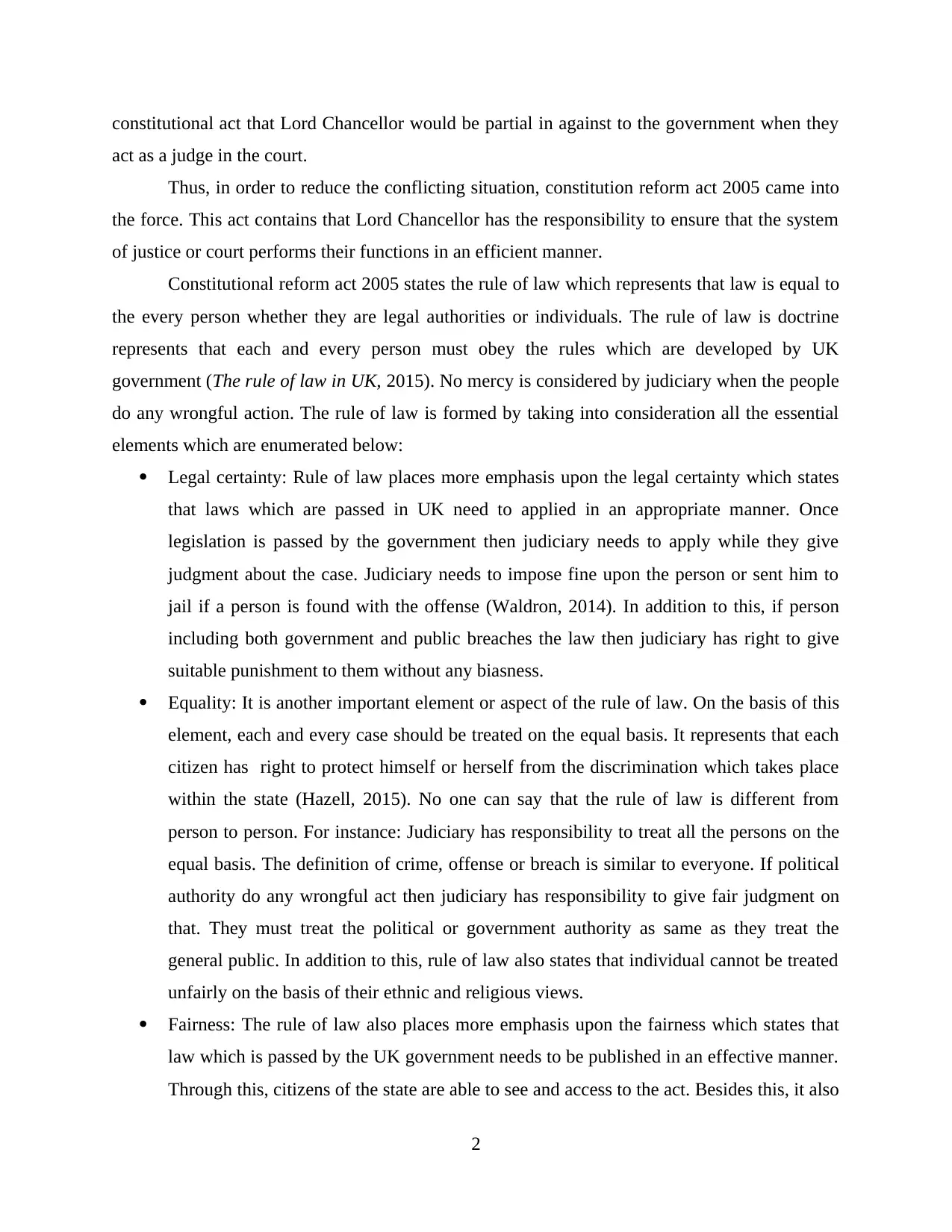
constitutional act that Lord Chancellor would be partial in against to the government when they
act as a judge in the court.
Thus, in order to reduce the conflicting situation, constitution reform act 2005 came into
the force. This act contains that Lord Chancellor has the responsibility to ensure that the system
of justice or court performs their functions in an efficient manner.
Constitutional reform act 2005 states the rule of law which represents that law is equal to
the every person whether they are legal authorities or individuals. The rule of law is doctrine
represents that each and every person must obey the rules which are developed by UK
government (The rule of law in UK, 2015). No mercy is considered by judiciary when the people
do any wrongful action. The rule of law is formed by taking into consideration all the essential
elements which are enumerated below:
Legal certainty: Rule of law places more emphasis upon the legal certainty which states
that laws which are passed in UK need to applied in an appropriate manner. Once
legislation is passed by the government then judiciary needs to apply while they give
judgment about the case. Judiciary needs to impose fine upon the person or sent him to
jail if a person is found with the offense (Waldron, 2014). In addition to this, if person
including both government and public breaches the law then judiciary has right to give
suitable punishment to them without any biasness.
Equality: It is another important element or aspect of the rule of law. On the basis of this
element, each and every case should be treated on the equal basis. It represents that each
citizen has right to protect himself or herself from the discrimination which takes place
within the state (Hazell, 2015). No one can say that the rule of law is different from
person to person. For instance: Judiciary has responsibility to treat all the persons on the
equal basis. The definition of crime, offense or breach is similar to everyone. If political
authority do any wrongful act then judiciary has responsibility to give fair judgment on
that. They must treat the political or government authority as same as they treat the
general public. In addition to this, rule of law also states that individual cannot be treated
unfairly on the basis of their ethnic and religious views.
Fairness: The rule of law also places more emphasis upon the fairness which states that
law which is passed by the UK government needs to be published in an effective manner.
Through this, citizens of the state are able to see and access to the act. Besides this, it also
2
act as a judge in the court.
Thus, in order to reduce the conflicting situation, constitution reform act 2005 came into
the force. This act contains that Lord Chancellor has the responsibility to ensure that the system
of justice or court performs their functions in an efficient manner.
Constitutional reform act 2005 states the rule of law which represents that law is equal to
the every person whether they are legal authorities or individuals. The rule of law is doctrine
represents that each and every person must obey the rules which are developed by UK
government (The rule of law in UK, 2015). No mercy is considered by judiciary when the people
do any wrongful action. The rule of law is formed by taking into consideration all the essential
elements which are enumerated below:
Legal certainty: Rule of law places more emphasis upon the legal certainty which states
that laws which are passed in UK need to applied in an appropriate manner. Once
legislation is passed by the government then judiciary needs to apply while they give
judgment about the case. Judiciary needs to impose fine upon the person or sent him to
jail if a person is found with the offense (Waldron, 2014). In addition to this, if person
including both government and public breaches the law then judiciary has right to give
suitable punishment to them without any biasness.
Equality: It is another important element or aspect of the rule of law. On the basis of this
element, each and every case should be treated on the equal basis. It represents that each
citizen has right to protect himself or herself from the discrimination which takes place
within the state (Hazell, 2015). No one can say that the rule of law is different from
person to person. For instance: Judiciary has responsibility to treat all the persons on the
equal basis. The definition of crime, offense or breach is similar to everyone. If political
authority do any wrongful act then judiciary has responsibility to give fair judgment on
that. They must treat the political or government authority as same as they treat the
general public. In addition to this, rule of law also states that individual cannot be treated
unfairly on the basis of their ethnic and religious views.
Fairness: The rule of law also places more emphasis upon the fairness which states that
law which is passed by the UK government needs to be published in an effective manner.
Through this, citizens of the state are able to see and access to the act. Besides this, it also
2
Paraphrase This Document
Need a fresh take? Get an instant paraphrase of this document with our AI Paraphraser
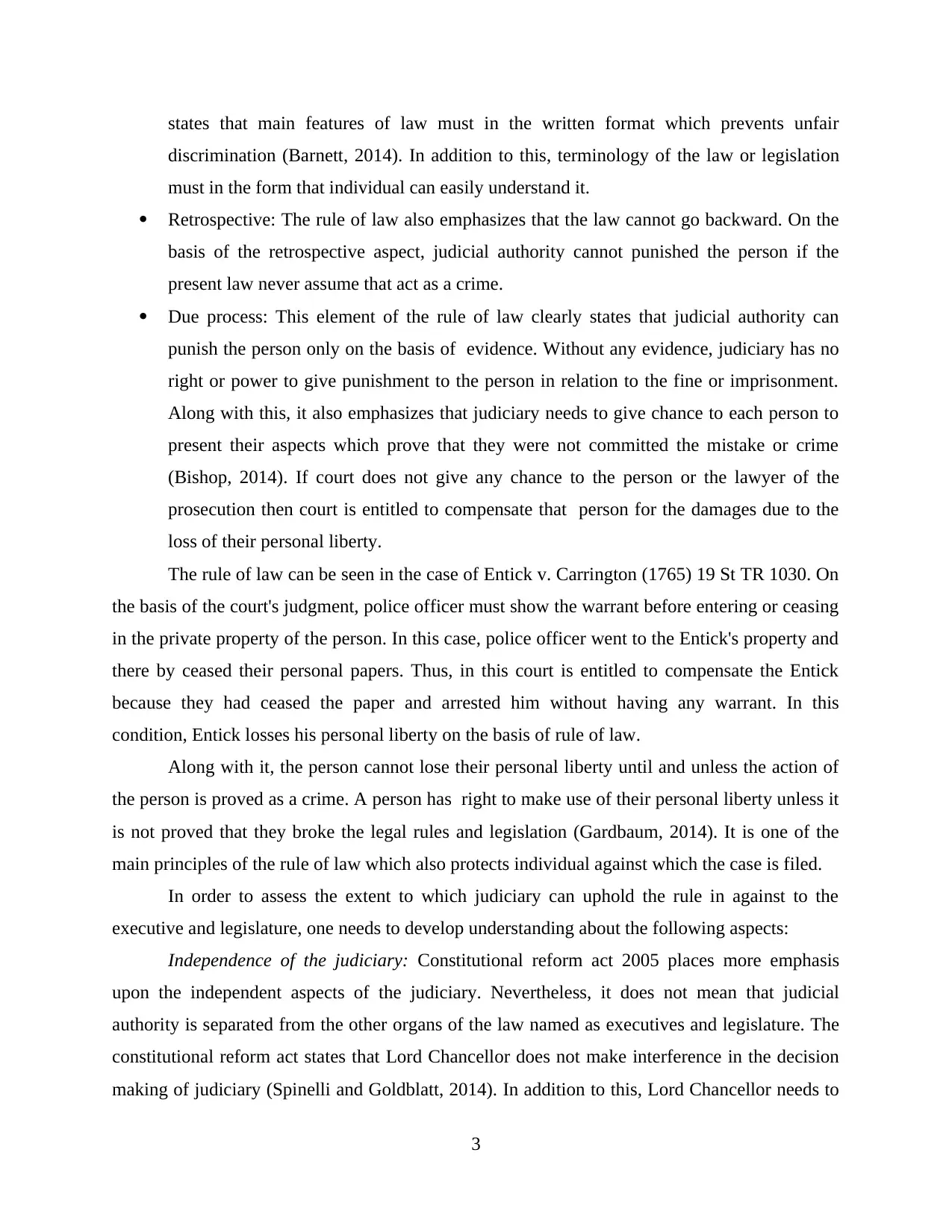
states that main features of law must in the written format which prevents unfair
discrimination (Barnett, 2014). In addition to this, terminology of the law or legislation
must in the form that individual can easily understand it.
Retrospective: The rule of law also emphasizes that the law cannot go backward. On the
basis of the retrospective aspect, judicial authority cannot punished the person if the
present law never assume that act as a crime.
Due process: This element of the rule of law clearly states that judicial authority can
punish the person only on the basis of evidence. Without any evidence, judiciary has no
right or power to give punishment to the person in relation to the fine or imprisonment.
Along with this, it also emphasizes that judiciary needs to give chance to each person to
present their aspects which prove that they were not committed the mistake or crime
(Bishop, 2014). If court does not give any chance to the person or the lawyer of the
prosecution then court is entitled to compensate that person for the damages due to the
loss of their personal liberty.
The rule of law can be seen in the case of Entick v. Carrington (1765) 19 St TR 1030. On
the basis of the court's judgment, police officer must show the warrant before entering or ceasing
in the private property of the person. In this case, police officer went to the Entick's property and
there by ceased their personal papers. Thus, in this court is entitled to compensate the Entick
because they had ceased the paper and arrested him without having any warrant. In this
condition, Entick losses his personal liberty on the basis of rule of law.
Along with it, the person cannot lose their personal liberty until and unless the action of
the person is proved as a crime. A person has right to make use of their personal liberty unless it
is not proved that they broke the legal rules and legislation (Gardbaum, 2014). It is one of the
main principles of the rule of law which also protects individual against which the case is filed.
In order to assess the extent to which judiciary can uphold the rule in against to the
executive and legislature, one needs to develop understanding about the following aspects:
Independence of the judiciary: Constitutional reform act 2005 places more emphasis
upon the independent aspects of the judiciary. Nevertheless, it does not mean that judicial
authority is separated from the other organs of the law named as executives and legislature. The
constitutional reform act states that Lord Chancellor does not make interference in the decision
making of judiciary (Spinelli and Goldblatt, 2014). In addition to this, Lord Chancellor needs to
3
discrimination (Barnett, 2014). In addition to this, terminology of the law or legislation
must in the form that individual can easily understand it.
Retrospective: The rule of law also emphasizes that the law cannot go backward. On the
basis of the retrospective aspect, judicial authority cannot punished the person if the
present law never assume that act as a crime.
Due process: This element of the rule of law clearly states that judicial authority can
punish the person only on the basis of evidence. Without any evidence, judiciary has no
right or power to give punishment to the person in relation to the fine or imprisonment.
Along with this, it also emphasizes that judiciary needs to give chance to each person to
present their aspects which prove that they were not committed the mistake or crime
(Bishop, 2014). If court does not give any chance to the person or the lawyer of the
prosecution then court is entitled to compensate that person for the damages due to the
loss of their personal liberty.
The rule of law can be seen in the case of Entick v. Carrington (1765) 19 St TR 1030. On
the basis of the court's judgment, police officer must show the warrant before entering or ceasing
in the private property of the person. In this case, police officer went to the Entick's property and
there by ceased their personal papers. Thus, in this court is entitled to compensate the Entick
because they had ceased the paper and arrested him without having any warrant. In this
condition, Entick losses his personal liberty on the basis of rule of law.
Along with it, the person cannot lose their personal liberty until and unless the action of
the person is proved as a crime. A person has right to make use of their personal liberty unless it
is not proved that they broke the legal rules and legislation (Gardbaum, 2014). It is one of the
main principles of the rule of law which also protects individual against which the case is filed.
In order to assess the extent to which judiciary can uphold the rule in against to the
executive and legislature, one needs to develop understanding about the following aspects:
Independence of the judiciary: Constitutional reform act 2005 places more emphasis
upon the independent aspects of the judiciary. Nevertheless, it does not mean that judicial
authority is separated from the other organs of the law named as executives and legislature. The
constitutional reform act states that Lord Chancellor does not make interference in the decision
making of judiciary (Spinelli and Goldblatt, 2014). In addition to this, Lord Chancellor needs to
3
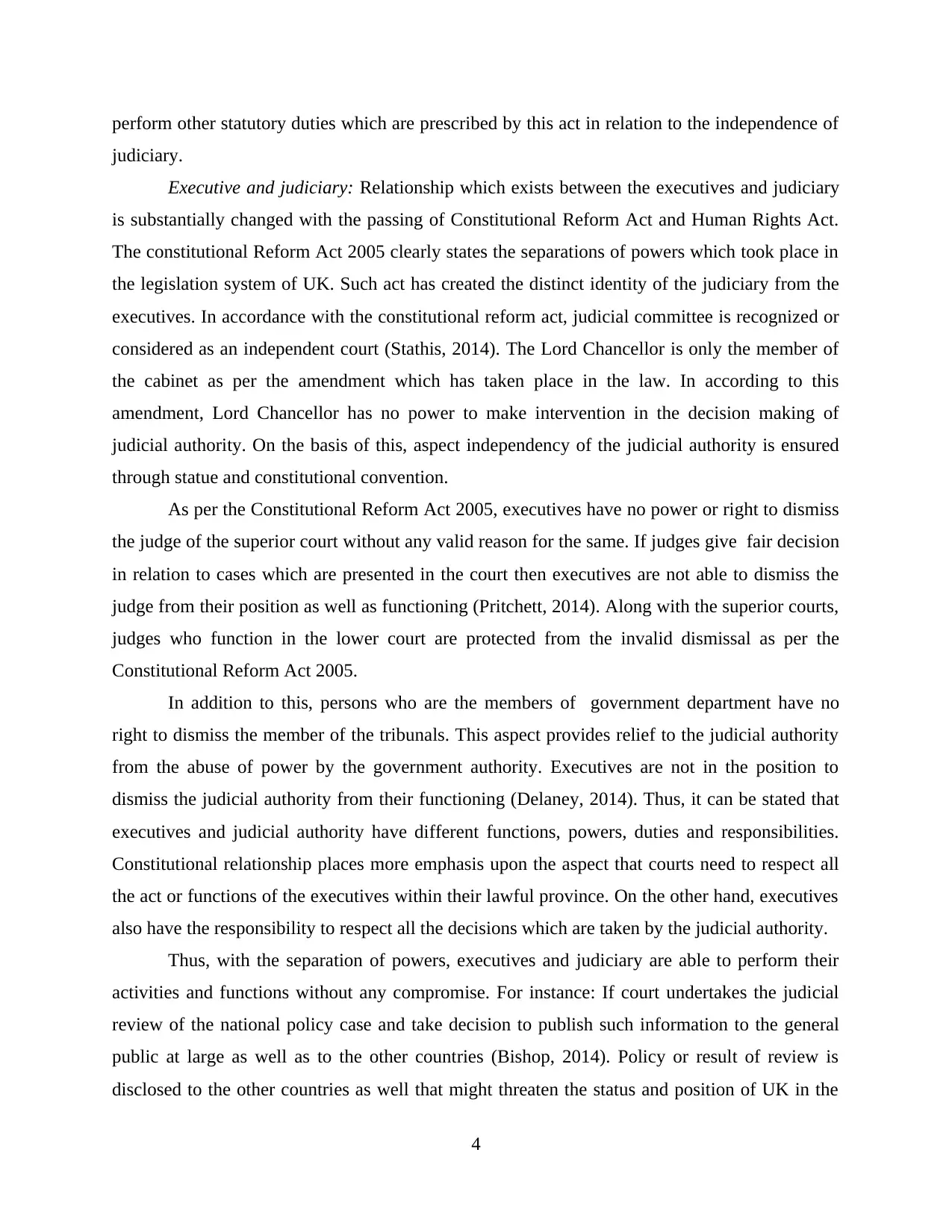
perform other statutory duties which are prescribed by this act in relation to the independence of
judiciary.
Executive and judiciary: Relationship which exists between the executives and judiciary
is substantially changed with the passing of Constitutional Reform Act and Human Rights Act.
The constitutional Reform Act 2005 clearly states the separations of powers which took place in
the legislation system of UK. Such act has created the distinct identity of the judiciary from the
executives. In accordance with the constitutional reform act, judicial committee is recognized or
considered as an independent court (Stathis, 2014). The Lord Chancellor is only the member of
the cabinet as per the amendment which has taken place in the law. In according to this
amendment, Lord Chancellor has no power to make intervention in the decision making of
judicial authority. On the basis of this, aspect independency of the judicial authority is ensured
through statue and constitutional convention.
As per the Constitutional Reform Act 2005, executives have no power or right to dismiss
the judge of the superior court without any valid reason for the same. If judges give fair decision
in relation to cases which are presented in the court then executives are not able to dismiss the
judge from their position as well as functioning (Pritchett, 2014). Along with the superior courts,
judges who function in the lower court are protected from the invalid dismissal as per the
Constitutional Reform Act 2005.
In addition to this, persons who are the members of government department have no
right to dismiss the member of the tribunals. This aspect provides relief to the judicial authority
from the abuse of power by the government authority. Executives are not in the position to
dismiss the judicial authority from their functioning (Delaney, 2014). Thus, it can be stated that
executives and judicial authority have different functions, powers, duties and responsibilities.
Constitutional relationship places more emphasis upon the aspect that courts need to respect all
the act or functions of the executives within their lawful province. On the other hand, executives
also have the responsibility to respect all the decisions which are taken by the judicial authority.
Thus, with the separation of powers, executives and judiciary are able to perform their
activities and functions without any compromise. For instance: If court undertakes the judicial
review of the national policy case and take decision to publish such information to the general
public at large as well as to the other countries (Bishop, 2014). Policy or result of review is
disclosed to the other countries as well that might threaten the status and position of UK in the
4
judiciary.
Executive and judiciary: Relationship which exists between the executives and judiciary
is substantially changed with the passing of Constitutional Reform Act and Human Rights Act.
The constitutional Reform Act 2005 clearly states the separations of powers which took place in
the legislation system of UK. Such act has created the distinct identity of the judiciary from the
executives. In accordance with the constitutional reform act, judicial committee is recognized or
considered as an independent court (Stathis, 2014). The Lord Chancellor is only the member of
the cabinet as per the amendment which has taken place in the law. In according to this
amendment, Lord Chancellor has no power to make intervention in the decision making of
judicial authority. On the basis of this, aspect independency of the judicial authority is ensured
through statue and constitutional convention.
As per the Constitutional Reform Act 2005, executives have no power or right to dismiss
the judge of the superior court without any valid reason for the same. If judges give fair decision
in relation to cases which are presented in the court then executives are not able to dismiss the
judge from their position as well as functioning (Pritchett, 2014). Along with the superior courts,
judges who function in the lower court are protected from the invalid dismissal as per the
Constitutional Reform Act 2005.
In addition to this, persons who are the members of government department have no
right to dismiss the member of the tribunals. This aspect provides relief to the judicial authority
from the abuse of power by the government authority. Executives are not in the position to
dismiss the judicial authority from their functioning (Delaney, 2014). Thus, it can be stated that
executives and judicial authority have different functions, powers, duties and responsibilities.
Constitutional relationship places more emphasis upon the aspect that courts need to respect all
the act or functions of the executives within their lawful province. On the other hand, executives
also have the responsibility to respect all the decisions which are taken by the judicial authority.
Thus, with the separation of powers, executives and judiciary are able to perform their
activities and functions without any compromise. For instance: If court undertakes the judicial
review of the national policy case and take decision to publish such information to the general
public at large as well as to the other countries (Bishop, 2014). Policy or result of review is
disclosed to the other countries as well that might threaten the status and position of UK in the
4
⊘ This is a preview!⊘
Do you want full access?
Subscribe today to unlock all pages.

Trusted by 1+ million students worldwide
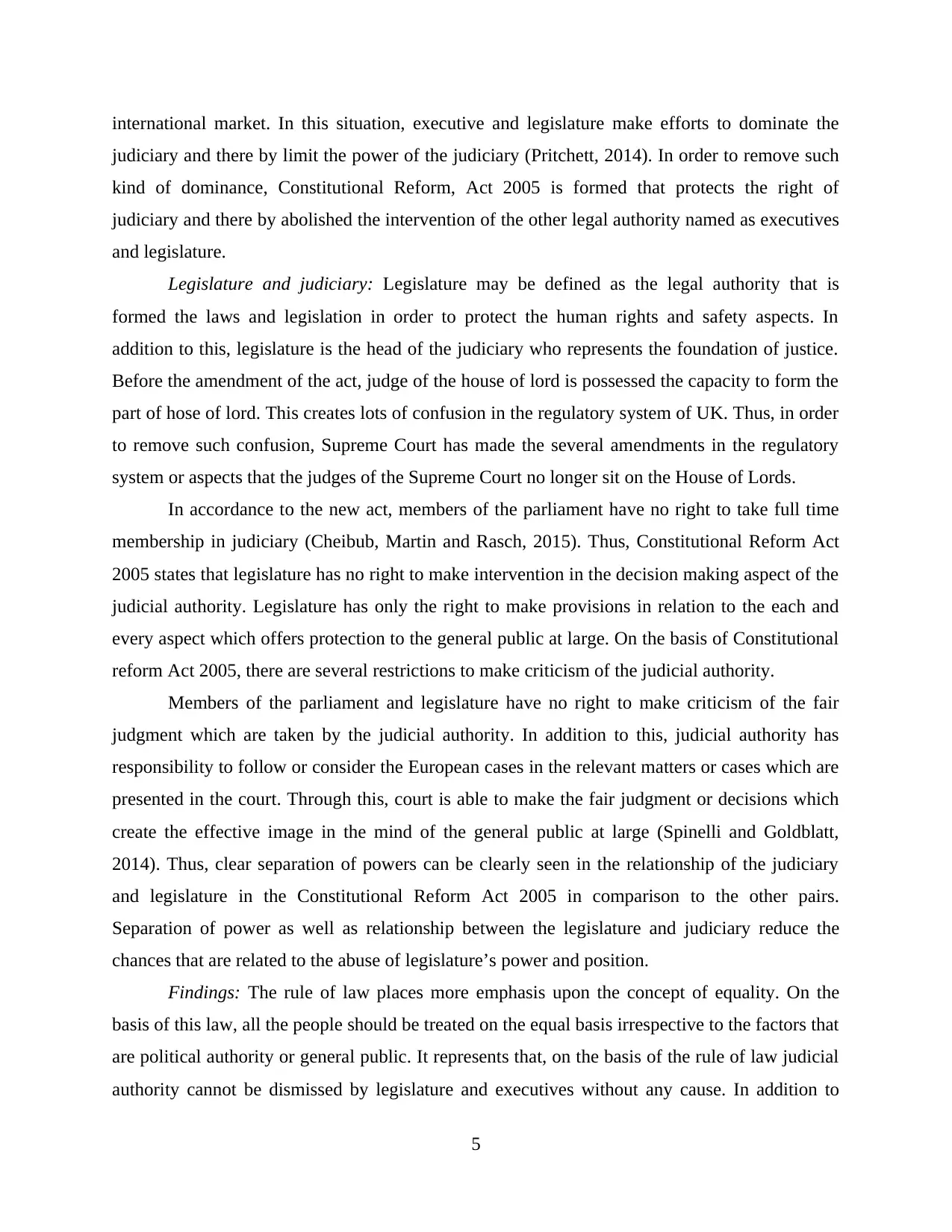
international market. In this situation, executive and legislature make efforts to dominate the
judiciary and there by limit the power of the judiciary (Pritchett, 2014). In order to remove such
kind of dominance, Constitutional Reform, Act 2005 is formed that protects the right of
judiciary and there by abolished the intervention of the other legal authority named as executives
and legislature.
Legislature and judiciary: Legislature may be defined as the legal authority that is
formed the laws and legislation in order to protect the human rights and safety aspects. In
addition to this, legislature is the head of the judiciary who represents the foundation of justice.
Before the amendment of the act, judge of the house of lord is possessed the capacity to form the
part of hose of lord. This creates lots of confusion in the regulatory system of UK. Thus, in order
to remove such confusion, Supreme Court has made the several amendments in the regulatory
system or aspects that the judges of the Supreme Court no longer sit on the House of Lords.
In accordance to the new act, members of the parliament have no right to take full time
membership in judiciary (Cheibub, Martin and Rasch, 2015). Thus, Constitutional Reform Act
2005 states that legislature has no right to make intervention in the decision making aspect of the
judicial authority. Legislature has only the right to make provisions in relation to the each and
every aspect which offers protection to the general public at large. On the basis of Constitutional
reform Act 2005, there are several restrictions to make criticism of the judicial authority.
Members of the parliament and legislature have no right to make criticism of the fair
judgment which are taken by the judicial authority. In addition to this, judicial authority has
responsibility to follow or consider the European cases in the relevant matters or cases which are
presented in the court. Through this, court is able to make the fair judgment or decisions which
create the effective image in the mind of the general public at large (Spinelli and Goldblatt,
2014). Thus, clear separation of powers can be clearly seen in the relationship of the judiciary
and legislature in the Constitutional Reform Act 2005 in comparison to the other pairs.
Separation of power as well as relationship between the legislature and judiciary reduce the
chances that are related to the abuse of legislature’s power and position.
Findings: The rule of law places more emphasis upon the concept of equality. On the
basis of this law, all the people should be treated on the equal basis irrespective to the factors that
are political authority or general public. It represents that, on the basis of the rule of law judicial
authority cannot be dismissed by legislature and executives without any cause. In addition to
5
judiciary and there by limit the power of the judiciary (Pritchett, 2014). In order to remove such
kind of dominance, Constitutional Reform, Act 2005 is formed that protects the right of
judiciary and there by abolished the intervention of the other legal authority named as executives
and legislature.
Legislature and judiciary: Legislature may be defined as the legal authority that is
formed the laws and legislation in order to protect the human rights and safety aspects. In
addition to this, legislature is the head of the judiciary who represents the foundation of justice.
Before the amendment of the act, judge of the house of lord is possessed the capacity to form the
part of hose of lord. This creates lots of confusion in the regulatory system of UK. Thus, in order
to remove such confusion, Supreme Court has made the several amendments in the regulatory
system or aspects that the judges of the Supreme Court no longer sit on the House of Lords.
In accordance to the new act, members of the parliament have no right to take full time
membership in judiciary (Cheibub, Martin and Rasch, 2015). Thus, Constitutional Reform Act
2005 states that legislature has no right to make intervention in the decision making aspect of the
judicial authority. Legislature has only the right to make provisions in relation to the each and
every aspect which offers protection to the general public at large. On the basis of Constitutional
reform Act 2005, there are several restrictions to make criticism of the judicial authority.
Members of the parliament and legislature have no right to make criticism of the fair
judgment which are taken by the judicial authority. In addition to this, judicial authority has
responsibility to follow or consider the European cases in the relevant matters or cases which are
presented in the court. Through this, court is able to make the fair judgment or decisions which
create the effective image in the mind of the general public at large (Spinelli and Goldblatt,
2014). Thus, clear separation of powers can be clearly seen in the relationship of the judiciary
and legislature in the Constitutional Reform Act 2005 in comparison to the other pairs.
Separation of power as well as relationship between the legislature and judiciary reduce the
chances that are related to the abuse of legislature’s power and position.
Findings: The rule of law places more emphasis upon the concept of equality. On the
basis of this law, all the people should be treated on the equal basis irrespective to the factors that
are political authority or general public. It represents that, on the basis of the rule of law judicial
authority cannot be dismissed by legislature and executives without any cause. In addition to
5
Paraphrase This Document
Need a fresh take? Get an instant paraphrase of this document with our AI Paraphraser
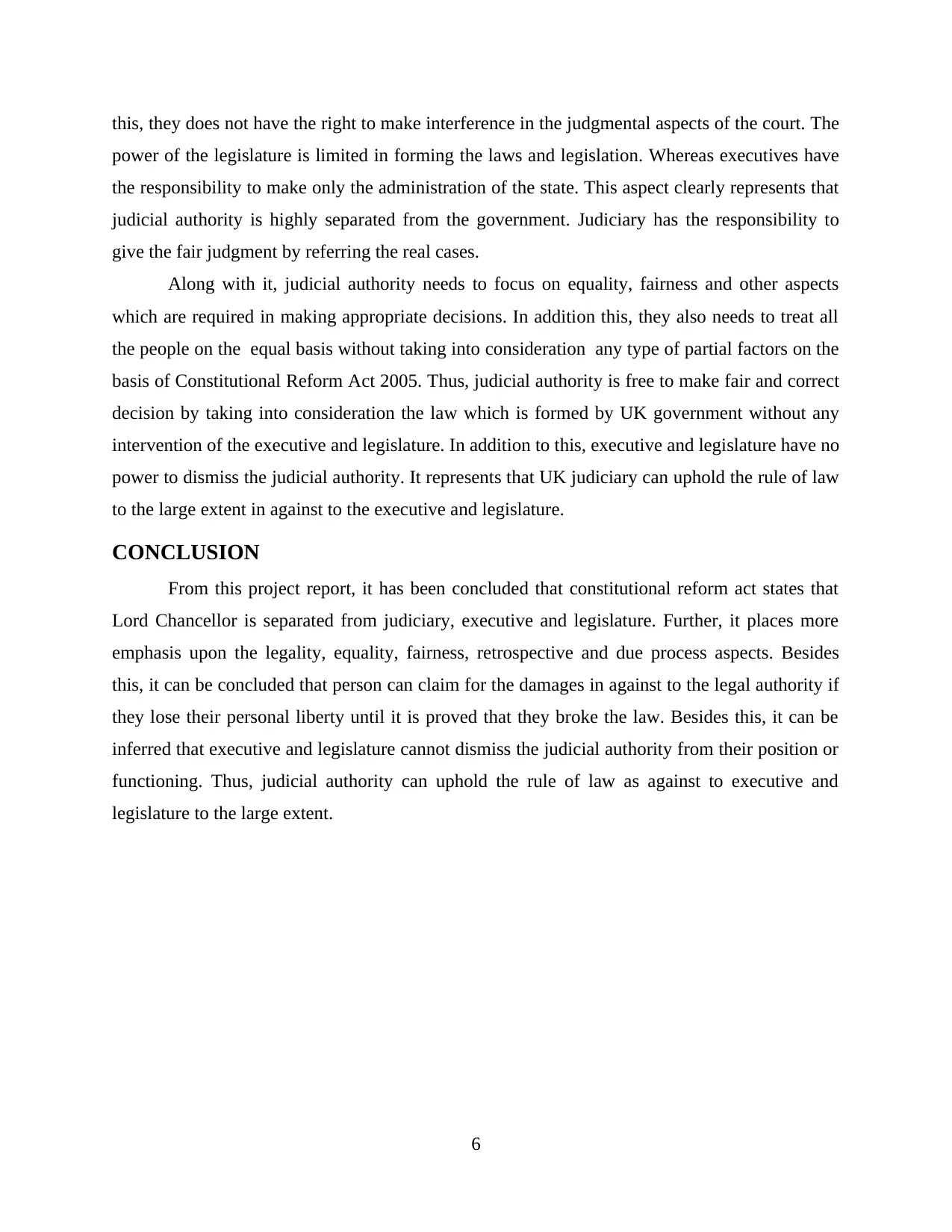
this, they does not have the right to make interference in the judgmental aspects of the court. The
power of the legislature is limited in forming the laws and legislation. Whereas executives have
the responsibility to make only the administration of the state. This aspect clearly represents that
judicial authority is highly separated from the government. Judiciary has the responsibility to
give the fair judgment by referring the real cases.
Along with it, judicial authority needs to focus on equality, fairness and other aspects
which are required in making appropriate decisions. In addition this, they also needs to treat all
the people on the equal basis without taking into consideration any type of partial factors on the
basis of Constitutional Reform Act 2005. Thus, judicial authority is free to make fair and correct
decision by taking into consideration the law which is formed by UK government without any
intervention of the executive and legislature. In addition to this, executive and legislature have no
power to dismiss the judicial authority. It represents that UK judiciary can uphold the rule of law
to the large extent in against to the executive and legislature.
CONCLUSION
From this project report, it has been concluded that constitutional reform act states that
Lord Chancellor is separated from judiciary, executive and legislature. Further, it places more
emphasis upon the legality, equality, fairness, retrospective and due process aspects. Besides
this, it can be concluded that person can claim for the damages in against to the legal authority if
they lose their personal liberty until it is proved that they broke the law. Besides this, it can be
inferred that executive and legislature cannot dismiss the judicial authority from their position or
functioning. Thus, judicial authority can uphold the rule of law as against to executive and
legislature to the large extent.
6
power of the legislature is limited in forming the laws and legislation. Whereas executives have
the responsibility to make only the administration of the state. This aspect clearly represents that
judicial authority is highly separated from the government. Judiciary has the responsibility to
give the fair judgment by referring the real cases.
Along with it, judicial authority needs to focus on equality, fairness and other aspects
which are required in making appropriate decisions. In addition this, they also needs to treat all
the people on the equal basis without taking into consideration any type of partial factors on the
basis of Constitutional Reform Act 2005. Thus, judicial authority is free to make fair and correct
decision by taking into consideration the law which is formed by UK government without any
intervention of the executive and legislature. In addition to this, executive and legislature have no
power to dismiss the judicial authority. It represents that UK judiciary can uphold the rule of law
to the large extent in against to the executive and legislature.
CONCLUSION
From this project report, it has been concluded that constitutional reform act states that
Lord Chancellor is separated from judiciary, executive and legislature. Further, it places more
emphasis upon the legality, equality, fairness, retrospective and due process aspects. Besides
this, it can be concluded that person can claim for the damages in against to the legal authority if
they lose their personal liberty until it is proved that they broke the law. Besides this, it can be
inferred that executive and legislature cannot dismiss the judicial authority from their position or
functioning. Thus, judicial authority can uphold the rule of law as against to executive and
legislature to the large extent.
6
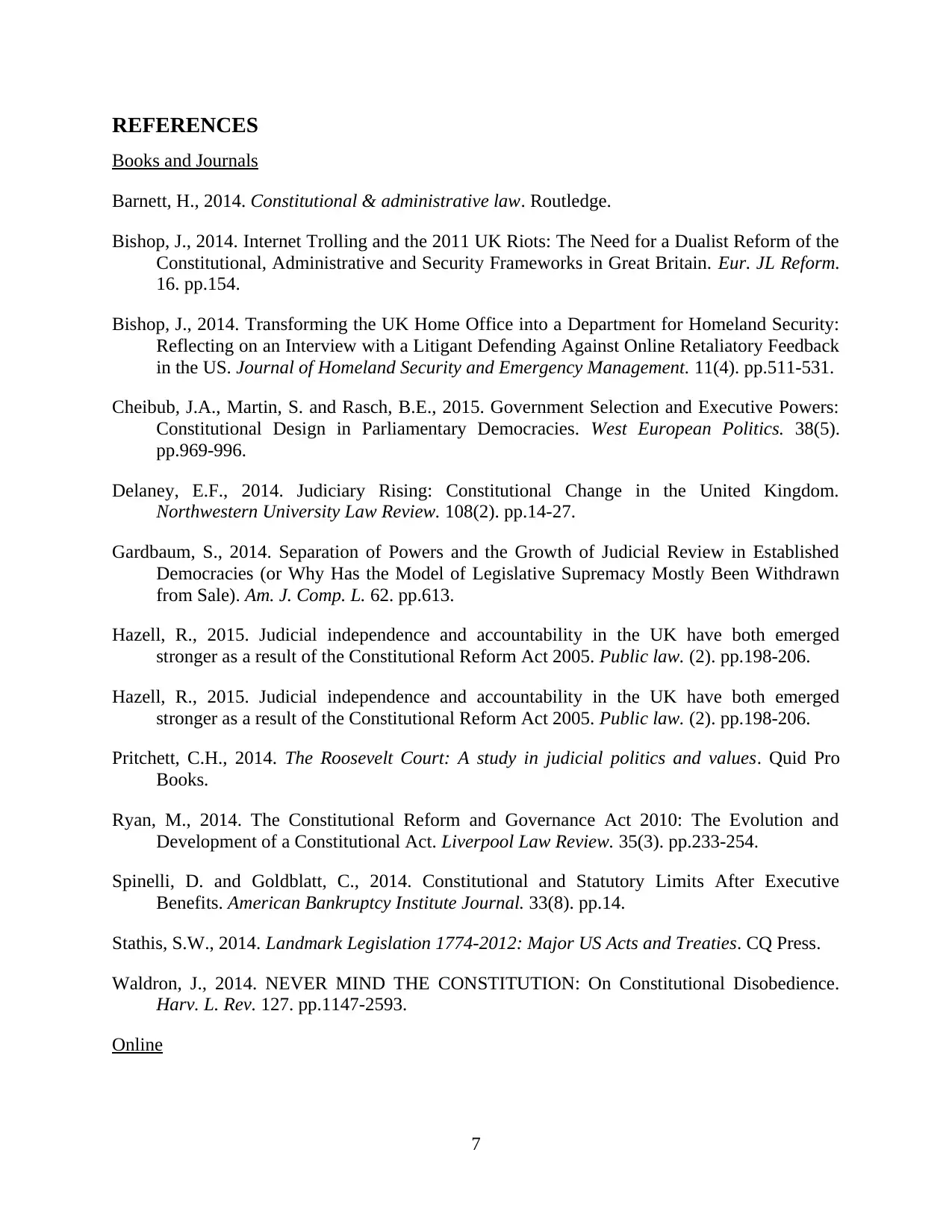
REFERENCES
Books and Journals
Barnett, H., 2014. Constitutional & administrative law. Routledge.
Bishop, J., 2014. Internet Trolling and the 2011 UK Riots: The Need for a Dualist Reform of the
Constitutional, Administrative and Security Frameworks in Great Britain. Eur. JL Reform.
16. pp.154.
Bishop, J., 2014. Transforming the UK Home Office into a Department for Homeland Security:
Reflecting on an Interview with a Litigant Defending Against Online Retaliatory Feedback
in the US. Journal of Homeland Security and Emergency Management. 11(4). pp.511-531.
Cheibub, J.A., Martin, S. and Rasch, B.E., 2015. Government Selection and Executive Powers:
Constitutional Design in Parliamentary Democracies. West European Politics. 38(5).
pp.969-996.
Delaney, E.F., 2014. Judiciary Rising: Constitutional Change in the United Kingdom.
Northwestern University Law Review. 108(2). pp.14-27.
Gardbaum, S., 2014. Separation of Powers and the Growth of Judicial Review in Established
Democracies (or Why Has the Model of Legislative Supremacy Mostly Been Withdrawn
from Sale). Am. J. Comp. L. 62. pp.613.
Hazell, R., 2015. Judicial independence and accountability in the UK have both emerged
stronger as a result of the Constitutional Reform Act 2005. Public law. (2). pp.198-206.
Hazell, R., 2015. Judicial independence and accountability in the UK have both emerged
stronger as a result of the Constitutional Reform Act 2005. Public law. (2). pp.198-206.
Pritchett, C.H., 2014. The Roosevelt Court: A study in judicial politics and values. Quid Pro
Books.
Ryan, M., 2014. The Constitutional Reform and Governance Act 2010: The Evolution and
Development of a Constitutional Act. Liverpool Law Review. 35(3). pp.233-254.
Spinelli, D. and Goldblatt, C., 2014. Constitutional and Statutory Limits After Executive
Benefits. American Bankruptcy Institute Journal. 33(8). pp.14.
Stathis, S.W., 2014. Landmark Legislation 1774-2012: Major US Acts and Treaties. CQ Press.
Waldron, J., 2014. NEVER MIND THE CONSTITUTION: On Constitutional Disobedience.
Harv. L. Rev. 127. pp.1147-2593.
Online
7
Books and Journals
Barnett, H., 2014. Constitutional & administrative law. Routledge.
Bishop, J., 2014. Internet Trolling and the 2011 UK Riots: The Need for a Dualist Reform of the
Constitutional, Administrative and Security Frameworks in Great Britain. Eur. JL Reform.
16. pp.154.
Bishop, J., 2014. Transforming the UK Home Office into a Department for Homeland Security:
Reflecting on an Interview with a Litigant Defending Against Online Retaliatory Feedback
in the US. Journal of Homeland Security and Emergency Management. 11(4). pp.511-531.
Cheibub, J.A., Martin, S. and Rasch, B.E., 2015. Government Selection and Executive Powers:
Constitutional Design in Parliamentary Democracies. West European Politics. 38(5).
pp.969-996.
Delaney, E.F., 2014. Judiciary Rising: Constitutional Change in the United Kingdom.
Northwestern University Law Review. 108(2). pp.14-27.
Gardbaum, S., 2014. Separation of Powers and the Growth of Judicial Review in Established
Democracies (or Why Has the Model of Legislative Supremacy Mostly Been Withdrawn
from Sale). Am. J. Comp. L. 62. pp.613.
Hazell, R., 2015. Judicial independence and accountability in the UK have both emerged
stronger as a result of the Constitutional Reform Act 2005. Public law. (2). pp.198-206.
Hazell, R., 2015. Judicial independence and accountability in the UK have both emerged
stronger as a result of the Constitutional Reform Act 2005. Public law. (2). pp.198-206.
Pritchett, C.H., 2014. The Roosevelt Court: A study in judicial politics and values. Quid Pro
Books.
Ryan, M., 2014. The Constitutional Reform and Governance Act 2010: The Evolution and
Development of a Constitutional Act. Liverpool Law Review. 35(3). pp.233-254.
Spinelli, D. and Goldblatt, C., 2014. Constitutional and Statutory Limits After Executive
Benefits. American Bankruptcy Institute Journal. 33(8). pp.14.
Stathis, S.W., 2014. Landmark Legislation 1774-2012: Major US Acts and Treaties. CQ Press.
Waldron, J., 2014. NEVER MIND THE CONSTITUTION: On Constitutional Disobedience.
Harv. L. Rev. 127. pp.1147-2593.
Online
7
⊘ This is a preview!⊘
Do you want full access?
Subscribe today to unlock all pages.

Trusted by 1+ million students worldwide
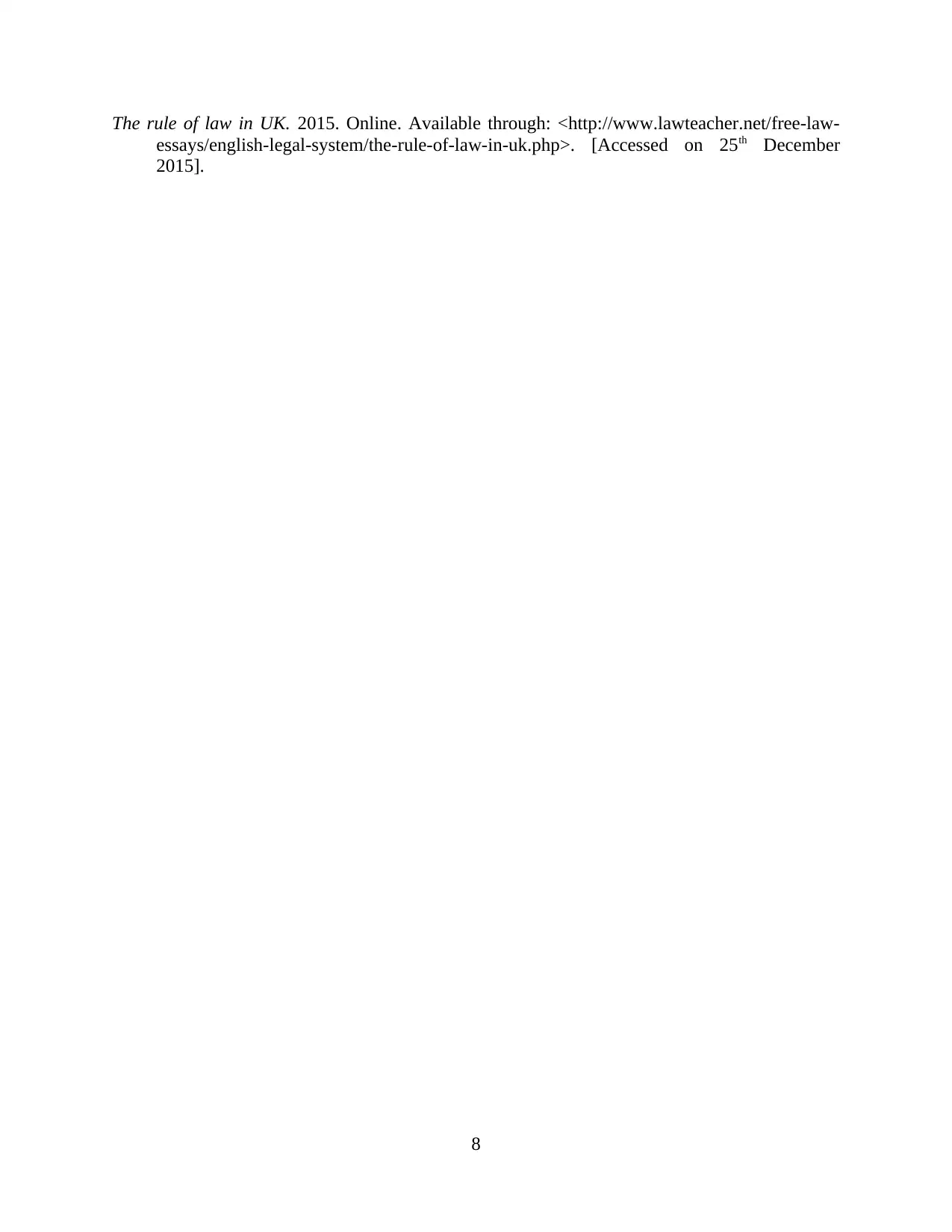
The rule of law in UK. 2015. Online. Available through: <http://www.lawteacher.net/free-law-
essays/english-legal-system/the-rule-of-law-in-uk.php>. [Accessed on 25th December
2015].
8
essays/english-legal-system/the-rule-of-law-in-uk.php>. [Accessed on 25th December
2015].
8
1 out of 10
Related Documents
Your All-in-One AI-Powered Toolkit for Academic Success.
+13062052269
info@desklib.com
Available 24*7 on WhatsApp / Email
![[object Object]](/_next/static/media/star-bottom.7253800d.svg)
Unlock your academic potential
Copyright © 2020–2026 A2Z Services. All Rights Reserved. Developed and managed by ZUCOL.





